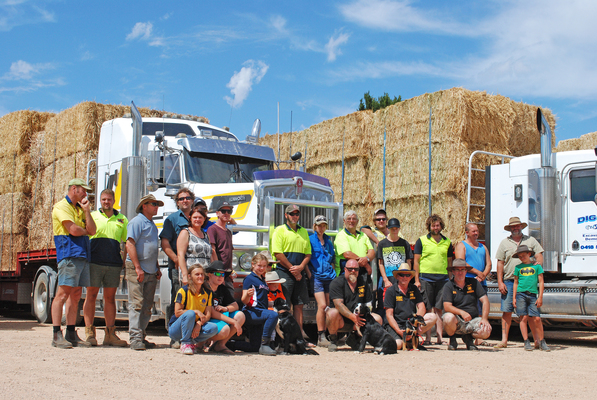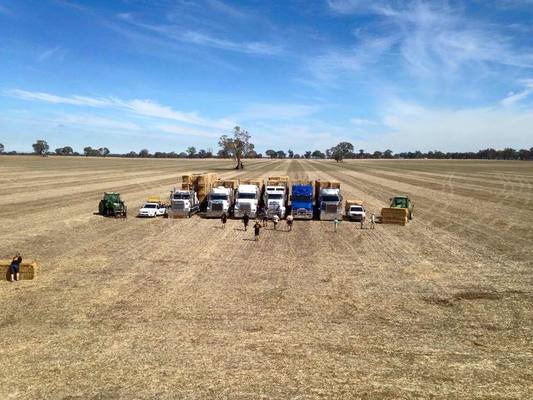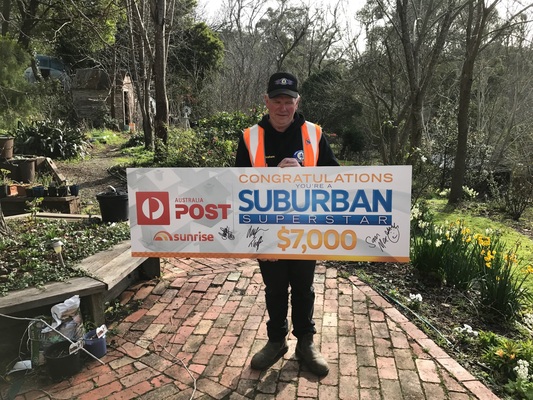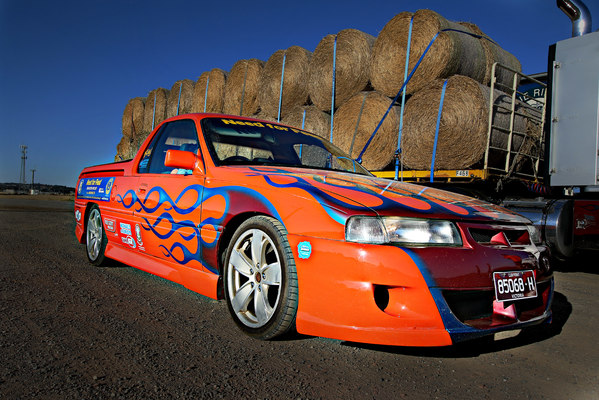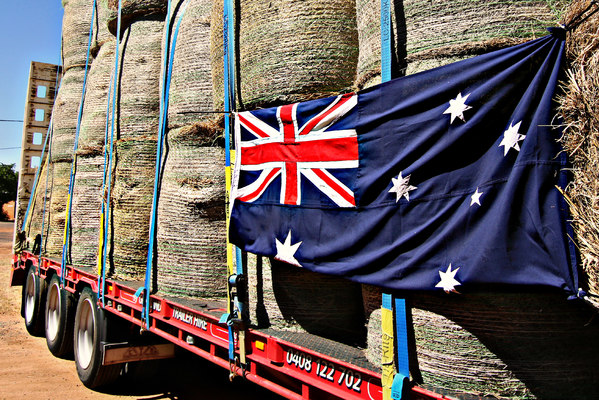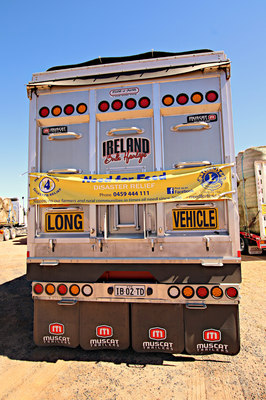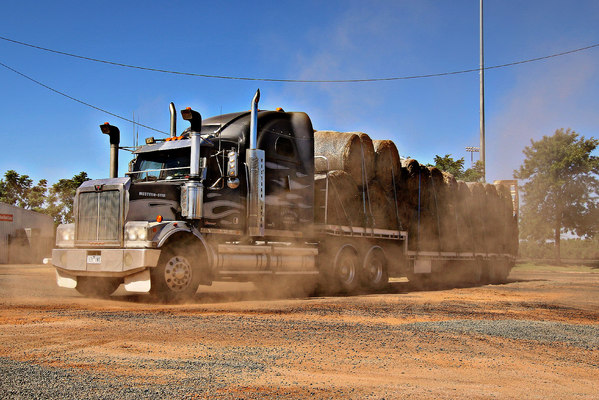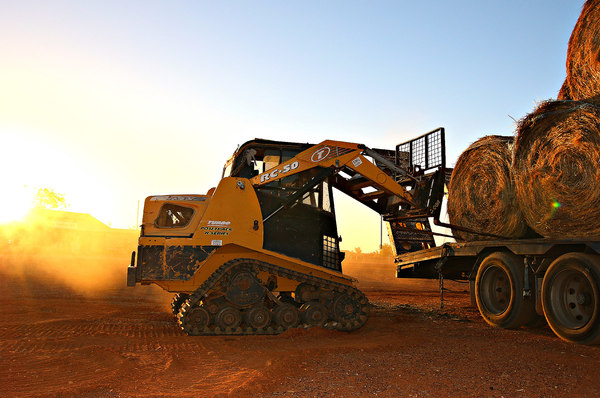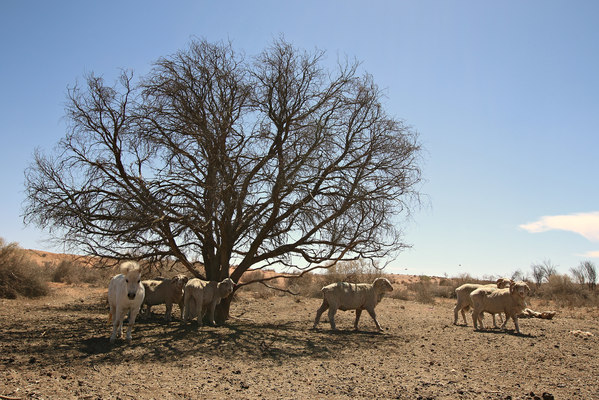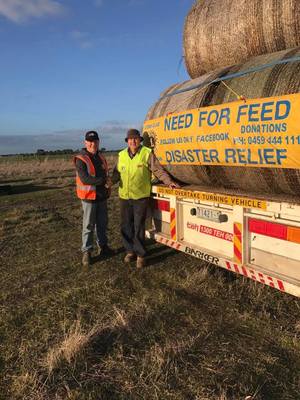By Kyra Gillespie
Need for Feed is the brainchild of Upper Beaconsfield mechanic Graham Cockerell, who was spurred into action during the east Gippsland bushfires of 2006.
“It was probably a little bit personal for me … there was a lot of talk back then of three farmers per week around Australia taking their own life, and others walking off the land,” Mr Cockerell said.
“I lost my father to farm-related suicide when I was a boy, and I didn’t deal with it at the time … I just didn’t. And then the 2006 fires came along; I was watching it all on the news and it was very close to the 40th anniversary of my father’s death, and I suppose things just came home to me really.”
Deciding he couldn’t sit back, Cockerell loaded up a borrowed truck with his own hay, and with his faithful hound by his side, travelled to the fire-ravaged farms of east Gippsland.
“We live on a hobby farm here in Upper Beaconsfield and had just had hay cut and still had some in the shed from the previous year, so I decided to give away one small truckload of hay.
“When we got down there, we found out the truckload of hay amounted to five small squares for each farmer in that one town, so it wasn’t really going to go anywhere.
“I had no intentions of doing any more than that one truckload of hay before I found out the real situation. When I got home I rounded up some mates and spoke to the local Lions Clubs and got something going.”
Neighbour Barry Medwin, who lost his first wife and daughter in the 1983 Ash Wednesday Fires, donated the next semi-load of hay.
Graham’s Lions Club and mates then ran a bushfire benefit which raised $23,000. The coverage of the event by a local paper sparked the idea for the charity.
“A local paper published a story on the events, with the headline ‘Need for Feed’ – and so we were born. Every year since then we have raised funds for fire, drought and flood relief.
“Over that time, Need for Feed has become the major supplier of emergency fodder and transport in Victoria and now operates in all states.
“We pride ourselves on being one of the few charities who remain totally volunteer-run with 100 per cent of funds donated reaching the purpose they were intended for.”
Need for Feed has now grown significantly since its inception at the Pakenham Lions Club.
They have donated around $3.5 million worth of fodder to farmers in 2018 alone.
“At one stage we had about 2700 requests for assistance and we’ve dealt with about half of them this year alone,” Mr Cockerell told the Gazette in November of 2018.
“We’ve done a bit over 400 truckloads of hay this year, which will be closer to 500 by the end of December, and we will have serviced around 1700 farmers by the end of the year. That equates to about 19,000 large rounds of hay.
“Our main effort this year has been in New South Wales; we’ve been doing drought relief in Victoria since January and we’ve been operating in New South Wales this year since early March and haven’t really stopped since.”
In between major monthly hay runs, a small fleet of trucks continue to provide relief to the areas that need it most.
“We’re going on a hay run once a month to New South Wales with volunteers, and then in between hay runs we’ve got four to five trucks working all the time as subcontractors.
“They’re all people who have volunteered for us but should be off working on harvesting in New South Wales this time of year – except there is no harvest. We’ve got them running around in trucks for us delivering and keeping things moving in between hay runs.
“Other than our contractors – who are really just keeping things going – the whole thing is totally managed by volunteers. On the bigger hay runs they’re all totally volunteers, even our contractors – they don’t get paid.”
Australia Day has been the biggest drive to date – with 90 trucks on the road on the one weekend from Dubbo to as far as the Hunter Valley and the centre-west.
An additional 17 trucks also headed up towards Broken Hill.
“For Australia Day next year we’ve got at least 50 road trains coming over from Western Australia, and we’re expecting more.”
Along with stock supplies, Need for Feed also donate care packs and food hampers to farmers and their families.
“I think a large part of what we do, especially with the drought, is more of a mental health thing – it’s more really to show people that somebody cares. There are so many people out there that need help and while you can’t rescue them all, but you can show them that there are people out there who care.”
Mental health can be a difficult subject for a lot of men to broach, which is another reason why Mr Cockerell believes the fodder drives are so important.
“On the bigger hay runs a lot of times the farmers get invited in; we usually have some sort of function before we come home and it’s a good chance for people to talk.
“But even with just single truck deliveries it’s good for them to see that there’s someone there for them – and very rarely somebody doesn’t want to have a chat.”
He said that droughts, unlike catastrophes like fire and flood, can be harder to remedy.
“With drought it’s a little bit different – and it’s the same with the dairy crisis – because it’s not as obvious. When people are doing it tough you can’t just drive past people’s places and notice that they’re doing it tough.
“That’s where local knowledge and stuff like that comes in. We take referrals from places like the Rural Financial Counselling Service Victoria, and sometimes as far as people registering online it’s actually the kids who will register the parents.“
Graham has always held community needs close to his heart; as a teenager he was part of the CFA, and when he moved to Cardinia Shire he was invited to join the local Rotary Club – which was then the Upper Beaconsfield club – where he became president in 1994.
After Rotary he ended up in the Berwick Lions Club and then transferred to Pakenham Lions in 2007.
When asked what his favourite part of coordinating Need for Feed was, Graham showed no hesitation when he replied: “The hay runs.”
“There’s a lot of good camaraderie and good-natured ribbing with the other drivers and such. They’re a really good bunch of blokes and we always have a good time,” he said.
“That’s probably the best part of it, and for our volunteers too; that you can enjoy yourself while helping somebody else. It’s really a win-win.”
He said the issue appears to strike a chord with many Australians.
“I think farming has got a special place in Australian’s hearts.
“I think when people see them doing it tough, and in circumstances beyond their control, they do whatever it takes to help them out.”
Mr Cockerell can’t see Need for Feed slowing down any time soon.
“I think we’ll be providing aid at least until autumn, and then if we don’t get good rains it will go on longer. And if we get fires over summer that’s a whole other story.”
To volunteer or donate to Need for Feed, visit www.needforfeed.org.

